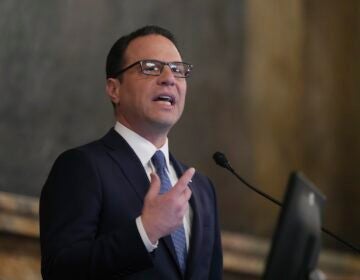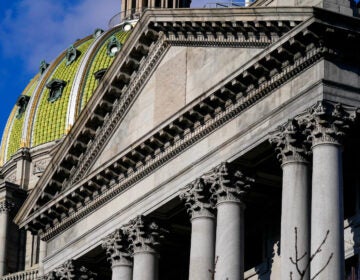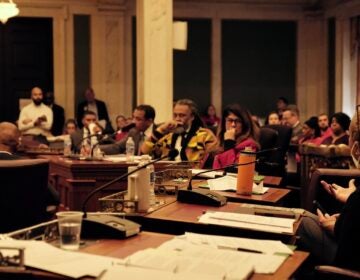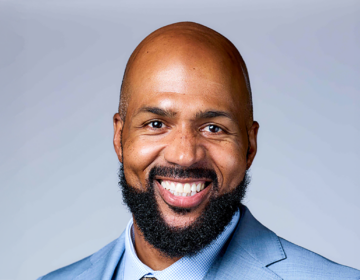Pa. budget: What’s in store for public schools?
Lawmakers passed a $50.1 billion 2025-26 state budget, providing $665 million for public schools, $175 million in cyber charter reforms and expanded student support programs.
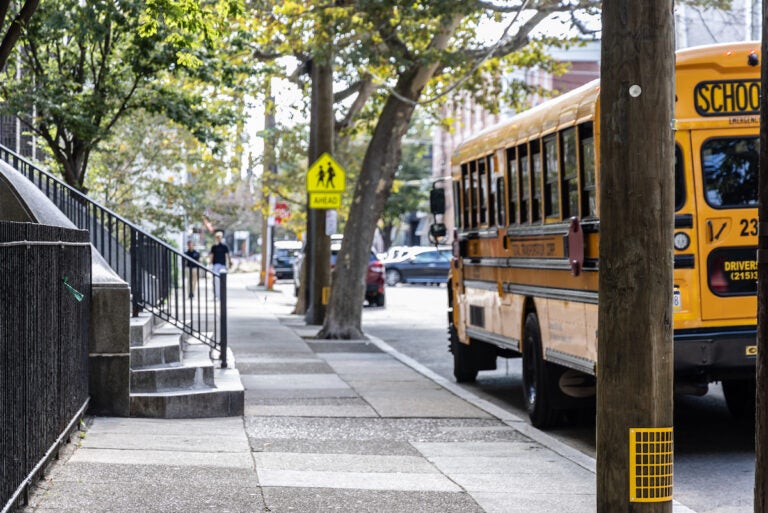
A school bus parks in Philadelphia’s Fishtown neighborhood. (Kimberly Paynter/WHYY)
From Philly and the Pa. suburbs to South Jersey and Delaware, what would you like WHYY News to cover? Let us know!
Pennsylvania lawmakers finally agreed on a $50.1 billion budget that brings long-awaited relief to school districts caught in the middle. The plan delivers new education funding and reforms, though not without financial concerns from the delay.
“This day has been a long time coming,” Gov. Josh Shapiro said as he signed the budget Wednesday in Harrisburg. “This is a balanced budget that cuts taxes, makes critical investments, protects 100% of the Rainy Day Fund and still leaves us with $8 billion in reserve.”
How much money are public schools receiving?
The spending plan increases education funding to a total of more than $900 million, including $565 million to be distributed through an “adequacy” formula meant to narrow the gap between well-resourced and struggling districts. The change stems from a 2023 Commonwealth Court ruling that found Pennsylvania’s system of funding public schools unconstitutional because it shortchanged lower-income districts.
Philadelphia Federation of Teachers President Arthur Steinberg called the deal both a relief and a reckoning after what he described as “an embarrassing and painful four-plus months of gridlock in Harrisburg that forced school districts, including Philadelphia’s, to take on massive debt just to keep the lights on.”
Steinberg said the new funding protects public education investments that are essential for equity.
“Governor Shapiro’s education priorities are largely intact, with badly needed increases approved for historically underfunded school districts, including the School District of Philadelphia,” he said in a statement. “Our students deserve bold investments that close the so-called adequacy gap between schools located in wealthy communities and schools serving poorer communities.”
What was the stalemate’s impact on Philly schools?
For Philadelphia, the cost of waiting was high. In September, the city’s school board authorized borrowing up to $1.55 billion to bridge missing state payments.
Philadelphia Board of Education President Reginald Streater said at a board meeting last week that the district had little choice but to borrow to maintain basic operations.
“The Board of Education had to borrow $1.5 billion to keep the lights on, to continue making the payments we have to make under the law,” he said. “And if we draw down completely on that, that’s $30 million,” Streater said.
The budget also introduces long-debated reforms to cyber charter schools, a move that will save local districts hundreds of millions of dollars statewide. Many superintendents have pressed lawmakers to rein in the high cost of those programs.
“And we finally reformed our cyber charter school system. If parents want to send their children to a cyber school, that’s fine — but we shouldn’t be overfunding them at the expense of our public schools,” Shapiro said. “This historic reform will save public schools across Pennsylvania $175 million.”
How would public cyber schools fare under the current funding?
Public cyber charter schools quickly reflected on the negative impact of the cuts.
“There are nearly 10,000 teachers, staff, and contracted providers across the Commonwealth working to serve approximately 65,000 students in public cyber charter schools,” said Debra Heath-Thornton, CEO of PA Virtual Charter School, in a written statement. “The 2025-2026 state budget will result in approximately 2,000 layoffs of cyber charter school teachers and staff due to significant funding cuts. I am devastated by the actions taken today by lawmakers in Harrisburg. We must work together to end the continued attacks on public education and on our most vulnerable children.”
Steinberg, on the other hand, was pleased with the reform for charter schools.
“It cost the school district of Philadelphia over a billion dollars out of their budget,” he said. “It is like a third of their budget. Just think of all the programs that we could fund if that money were in the traditional public schools where they belong.”
According to a press release, the budget builds on last year’s record education investments with more than $900 million in new funding for public schools. Since taking office, Shapiro has increased school funding by nearly $3 billion, marking one of the largest education commitments in state history.
The budget also includes $100 million for mental health and school safety. It boosts the Student Teacher Stipend Program by $10 million, raising total support to $30 million to help attract and retain educators. It also adds $5 million for public libraries and $433,000 for library services for the visually impaired, expands Grow PA scholarships, increases funding for special education and higher education grants, and invests $7.5 million to improve pre-K rates and strengthen the child care workforce. Universal free breakfast for all K-12 students and free lunch for 22,000 additional children will continue, serving nearly 93 million breakfasts served statewide during the 2024-25 school year.
Shapiro said the budget builds on “the progress we’ve made together to deliver better schools and more opportunity for our kids.”
WHYY News’ Carmen Russell-Scluchansky contributed to this story.

Get daily updates from WHYY News!
WHYY is your source for fact-based, in-depth journalism and information. As a nonprofit organization, we rely on financial support from readers like you. Please give today.


